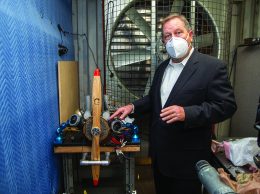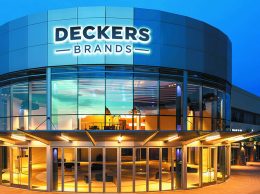BAROnova backers bet $27.3M on obesity device
IN THIS ARTICLE
- Technology Topic
- Stephen Nellis Author
By Stephen Nellis Friday, February 22nd, 2013
Goleta-based BAROnova has raised $27.3 million to fund clinical trials of its obesity treatment, bringing the medical device firm’s total funds raised to date to $41.3 million.
The company is developing a product it calls the TransPyloric Shuttle. The firm said the device may be able to slow the digestion process and create the sensation of fullness, which can in turn slow or stop patients from overeating.
Many obesity-oriented medical devices require surgery, but BAROnova said that the TransPyloric Shuttle device can be placed into the stomach endoscopically through the mouth in a 10-minute outpatient procedure and removed in about the same amount of time.
“Our device is designed to work in concert with the physiology of the body,” Hugh Narciso, the company’s founder, president and CEO, told the Business Times.
The shuttle looks like a ball with a tail on it. The ball sits in the stomach and the tail descends into the small intestine. During peristalsis, the contractions of the stomach muscles that move food through the digestive system, the device works somewhat like a ball value to regulate the flow of food into the small intestine. “The ultimate effect is that you fill up quicker and you stay full longer,” Narciso said.
Founded in 2006, the firm raised money to fund a study in Sweeden, whose results were promising enough to attach the attention of Lap-Band maker Allergan, which led a $7.5 million strategic investment round in 2008. Last year, Narciso said, the company conducted a study in Australia that generated superior weight loss to surgical approaches.
Now the company is gearing up for its first trial that will take place primarily in the United States. The company’s device is a Class III medical device that requires pre-market approval, and Narciso said BAROnova plans to use the data generated in the coming study to submit its application to the U.S. Food and Drug Administration. He said the company plans to aim for a label that would call for placing the device in the patient for up to a year.
“Our intended target population is the obese population or the morbidly obese population,” Narciso said. “Right now, this is a very underserved population. There’s one device that is approved to treat that population, and that is the Lap-Band.”
The reason that the population is underserved is a deep reluctance to undergo a surgery that is not easily reversible. Even at the higher end of the obesity scale, only 2 percent of patients who qualify for surgery end up receiving it.
“What the patient population is screaming is that 98 percent are doing nothing because they don’t want surgery to solve their problem,” Narciso said. “They’re looking for a temporary solution, not a permanent solution. They want something to help them get over the hump and lose some weight, and then they can handle it from there. That’s really what the patients are telling us.”
Beyond the regulatory process, perhaps the biggest question facing BAROnova is whether and how much private insurers and government programs would pay for its device. There is no way to tell at this point, but Narciso said the firm is hoping that its approach will dovetail with a greater expected emphasis on preventative medicine. Obesity is linked to a number of costly chronic diseases.
“The FDA and the other government agencies realize that obesity is a significant drain on the economy. Obesity is one of those things that can lead to things like heart disease, diabetes, cancer — you can go down the list,” Narciso said. “If you can tackle obesity before it becomes a major issue, you can become a preventative measure.”
The Series C funding round BAROnova closed on Feb. 15 was led by new investors Sante Ventures and Boston Scientific Corp. The deal included the firm’s earlier investors — ONSET Ventures, Highland Capital Partners and Arboretum Ventures — along with new investor Lumira Capital.
BAROnova’s previous fundraising round was the $7.5 million Series B round led by a strategic investment from Allergan, the firm that purchased Santa Barbara-based Lap-Band owner Inamed in a deal valued at more than $3 billion in 2006.











